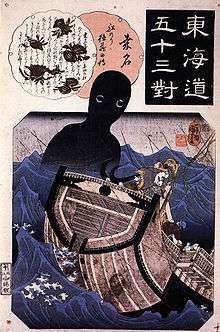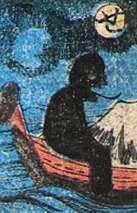Umibōzu

Umibōzu (海坊主, "sea bonze") is a spirit from Japanese folklore.
Mythology
The Umibōzu is said to live in the ocean and capsize the ship of anyone who dares speak to it. This spirit's name -- which combines the character for "sea" with the character for "Buddhist monk" -- is possibly related to the fact that the Umibōzu is said to have a large, round head resembling the shaven heads of Buddhist monks. Alternatively, it is a demonic Yōkai (spectres) that appear to shipwreck victims and fishermen. It is believed to be a drowned priest, exhibiting a shaven head and typically appears to be praying, along with having a perpetual smile. It is usually reported as having a grey, cloud-like torso and serpentine limbs.
According to one story, if angered (commonly when seamen insult or disrespect them), it asks that the crews provide a barrel that it proceeds to fill with sea water to drown them. To avoid this disastrous fate, it is necessary to give him a bottomless barrel.
This folktale is likely related to another Japanese tradition, which says that the souls of people who have no one to look after their graves take refuge at sea.
In popular culture

The umibōzu is a very well known yōkai as it is also recognized in modern Japanese culture:
- A traditional Umibōzu folktale is told in the second story arc of the anime Mononoke, a sequel to Ayakashi: Samurai Horror Tales, which combined folktales, Kabuki plays, and animated versions of 19th century woodblock art prints to retell classic ghost stories.
- In the anime 3000 Leagues in Search of Mother, episode 17-The Party for Equator (1976), Marco is fishing to catch a 'sea bonze'.
- Although not a main character, several Umibozu were seen in the fight against the demon in Great Yokai War.
- The umibōzu is also a monster of the day in the Super Sentai series Ninja Sentai Kakuranger and also appears as Hydro Hog in season 3 of Mighty Morphin Power Rangers in the 10 episode arc Mighty Morphin Alien Rangers.
- Umi-Bozu is a sub-boss in the arcade video game The Ocean Hunter. Umi-Bozu appear as a giant octopus that can become invisible.
- The anime One Piece contains a large underwater giant named Wadatsumi, he shares many of the characteristics of a sea bonze and is referred to as such by several of the main characters.
- In the anime and manga comic City Hunter, Umibozu is a big strong bald character.
- The manga Ginga: Nagareboshi Gin depicts the strongest dog of Japan, 'Benizakura', who's nicknamed 'Umibōzu' due to the champion's loss of its both ears and therefore resembling the sea monster.
- The anime Ghost In The Shell: Stand Alone Complex features an elite MSDF special forces unit nicknamed 'Umibozu', wearing dark grey armor and fielding high-end armorsuits.
- In the anime adaptation of Hanayamata, the character Masaru Ōfuna, a yosakoi goods store owner, is nicknamed 'Umibozu' because of his shaved head.
- The anime Gintama contains a bald humanoid named 'Umibouzu', known to be the most powerful alien-hunter in the universe.
- The Waterwraith from Pikmin 2 and the Plasm Wraith from Pikmin 3, both called "Amebouzu" in Japan, have a liquid, translucent form that can not be harmed and chase after the player.
- The Umibozu appears in Yo-kai Watch with its English dub name being Swosh. It is depicted as a recolored version of Dromp (the English dub name for Daidarabotchi).
- In the anime and manga Lovely Complex, Umibōzu is popular hip hop artist, whose music is characterized by angry lyrics, rough syncopated beats, and socio-political commentary.
- In the Video Game Nioh, Umi-Bozu appears as the boss of the Ocean Roars Again mission.
- Umi Bozu is Monster in My Pocket #118.
- In the Visual Novel Kajiri Kamui Kagura, an expedition crossing the ocean to the eastern side of Japan encounters a spirit resembling an Umibouzu which tries to capsize their fleet.
See also
- Sea monk
- Ningen
- Sea Draugr
References
| Wikimedia Commons has media related to Umibozu. |
- Allardice, Pamela. Myths, Gods, and Fantasy: A Sourcebook. Dorset: Prism Press, 1991. p. 209.
- Suzuki, Setsuko (Ed.) (1996). 英語で話す「日本の心」Keys to the Japanese Heart and Soul. Kodansha International. ISBN 978-4-7700-2082-6.
- The Obakemono Project
- Umi Bōzu – The Sea Monk a detailed account of umibozu at hyakumonogatari.com
